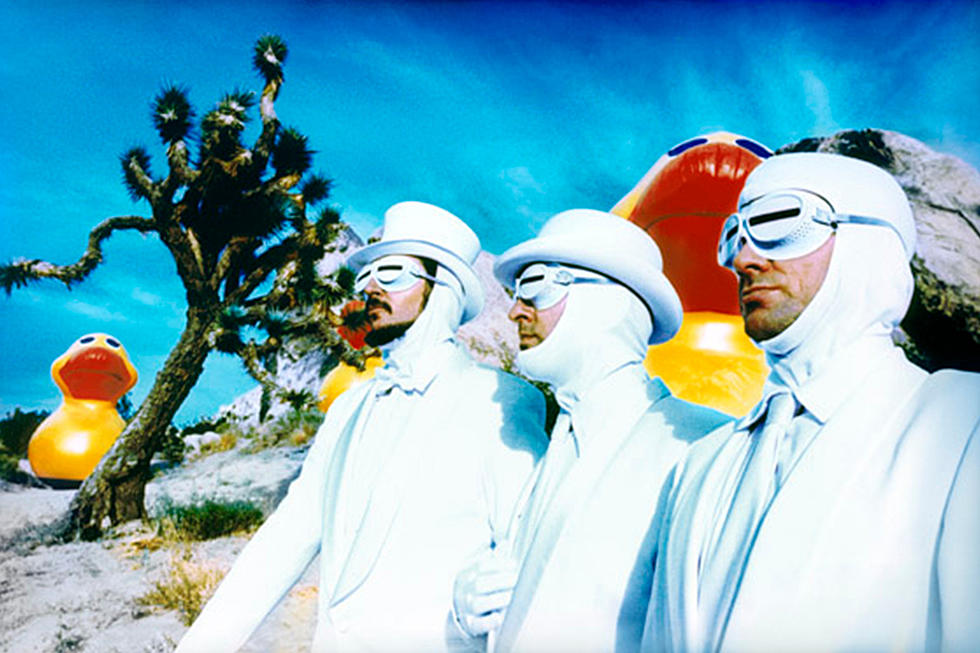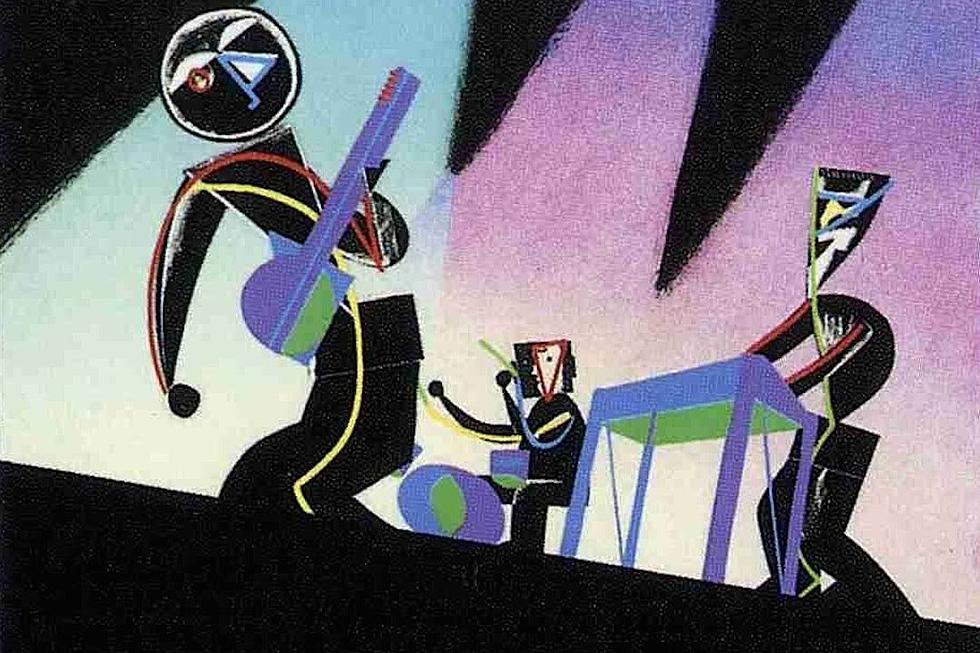
Primus Rehearsed Their ‘Asses Off’ for ‘A Tribute to Kings’ Tour
It was the '70s, so Les Claypool's longterm journey with the music of Rush officially began as you might expect, with a few warm beers in the parking lot as a teenager, followed by the arrival of a lot of vomit.
But once the future Primus mastermind was safely ensconced inside the sanctuary of San Francisco's Cow Palace, he was set for an evening of musical nirvana that would change his world.
Primus later snared the dream gig in 1992, opening for the Canadian prog legends as they continued to tour in support of their 1991 album Roll the Bones. The pairing established a lifelong friendship that remains intact between the two camps to this day.
Always challenging themselves creatively, the California trio have really leveled up with their latest excursion, a live tribute to Rush's 1977 opus A Farewell to Kings. As you might expect, they spent a lot of time preparing and working to get it right.
With a fresh leg of A Tribute to Kings tour dates set to launch in April, we spoke with Claypool via Zoom to discuss being a Rush fan and how they approached learning an album's worth of difficult Rush music.
How did you first get into Rush? What was your gateway?
My very first concert was Rush on the Hemispheres tour and it blew my 14 year old mind. The first album I heard by [the band] was A Farewell to Kings. When I was a kid, I didn’t have a stereo. I had like three records and a record player. I had two friends, brothers, and they each had their own stereos and a huge record collection. So we’d always go over to their house and listen to all of their records. I remember my buddy Jeff pulling out A Farewell to Kings and I was going, “What the hell is this?”
How much of a fan were you when you saw that first show?
Well, I was just starting to play bass, maybe a couple of months into it. Geddy [Lee] was my hero. So standing there at the Cow Palace, looking at the stage, Pat Travers played and he was amazing with Mars [Cowling] and Tommy Aldridge. Then, just looking at the stage setup while they’re setting up the gear, there’s Geddy’s Rickenbacker bass just sitting there, which was the holy grail for us. My buddy Bill Peterson, who unfortunately passed away a couple of years ago, he had a little bit of money.
So he’s like, “I’ve got a bass like that. That’s just like my bass!” I was like, “Goddammit!” I was all jealous of Bill Peterson, because he had a black Rickenbacker, just like Geddy. But it was a religious experience. It was my first concert, my buddy Dan Maloney, who actually builds my basses now, he was older and he drove us. Of course, he was old enough to buy beer, so I drank three warm Lowenbraus and threw up in the parking lot and bought a scalped ticket for a show that wasn’t sold out. So I paid more for the ticket than if I’d just bought one at the door. I just completely had my mind blown, watching the Rocinante [spaceship] fly through the black hole of Cygnus. It was incredibly epic.
Primus toured with Rush in 1992. What was it that established the long-lasting friendship between the two bands?
It was many things. Obviously, you know, their crew guy, Skip Gildersleeve, I used to read his name on the back of All The World’s a Stage, I hung out with him quite a bit. He’s like, “Oh, you’re just like Rush. There’s going to be no girls at Primus shows!” So there was a lot of that. I mean, it seems like we have more women at our shows nowadays, than we probably ever had. Also, you know, the progressive element, obviously [we are both] three piece [bands featuring] a guy with a big nose playing bass.
There were a lot of parallels you could draw. When Herb [drummer Tim “Herb” Alexander], Ler [guitarist Larry LaLonde] and I first got together, the one thing we bonded on was that we could play Rush. Ler came from this metal world, but he was also big into [Frank] Zappa and Grateful Dead. Herb was into all of this prog and world music. I was into all of this weird, eclectic stuff and had a strong soul and funk background. So we connected on playing Rush tunes, well, bits and pieces of their tunes. It wasn’t until just recently that I knew any Rush tunes in their entirety. You always knew little bits and pieces.
What's the first Rush song you learned how to play?
“What You’re Doing” [Claypool imitates riff]. Geddy was at my house a couple of years ago working on his book and he showed me that I’ve been playing it wrong the whole time. Pretty much everything that he showed, me, [I’d been doing it wrong]. That was part of the deal when I did the book for him. It was, “Well, you have to show me the proper way to play ‘YYZ’.” Of course, I’d been playing it wrong all of these years.
Listen to 'What You're Doing' by Rush
In those early days, what was the most intimidating thing about tackling Rush songs?
Well, the tone is a tough one. Getting that Geddy tone is hard. [Laughs] Especially when you play a piece of driftwood like I play, you know? That was always tough. The parts are just tough. You have to play with a couple of guys [that are up for the challenge]. Obviously, the [drum parts], somebody has to know what they’re doing to tackle those songs.
As far as doing A Farewell to Kings, obviously doing the vocals and the keyboards at the same time, while playing those bass parts and wearing a big double neck hunk of cinder block around your neck, it’s a challenging thing. But it’s been amazing. I look forward to it every night, playing that A Farewell to Kings set.
What was it like working through the aspects of getting A Farewell to Kings right?
It’s so hard to sing. My son was at the rehearsals and he took me aside and he said, “Look, you’ve just got to sing it the way you would sing it. Don’t try and sing it like Geddy.” He was getting the cringe factor, which is what kids are supposed to do. You know, my daughter is always the first one to tell me when my armpits are stinkin’. That’s what kids do -- they point out all of your flaws.
So I approached it differently. Because there’s some upper register stuff in Primus world too, you know? So I would just think of a character for different songs. Like, there’s the “Sgt. Baker,” a Primus song. “Sgt. Baker is my name.” [Claypool sings the section] When I go into that mode, I can hit those Geddy notes. I just started thinking of it in that way and I was able to hit a lot of those parts.
Some of it, I just had to sing it lower -- and Geddy sang it lower in the later years too. You know, a lot of it too, literally Ler would call Alex [Lifeson] and say, “What chord are you playing here?” Alex would help him. He actually sent him a couple of guitars, which was amazing. There were a couple of times I had to text Geddy and go, “What the hell? Jesus! Were you singing this in falsetto?” He’s like, “Nope, that was my full voice!” I’m like, “My God!”
That's great to hear you were able to tap the Rush "lifeline" in a sense.
Well, I posted a picture of Geddy and I playing when he was out here a couple years ago. I [had] just gotten into Instagram. It took me forever. My daughter was saying, “You’ve got to do Instagram. All of your fans are going to die off and no new fans are going to come. You have to be on Instagram.” You know, for me, social media is going on Craigslist looking for Chrysler parts and stuff. It hasn’t been my thing. I’ve been posting fishing pictures and stuff like that. But I posted that picture of Geddy and everybody just automatically assumed he was at my house teaching me how to play A Farewell to Kings.
What sort of feedback have you gotten from Geddy and Alex. Have they seen it?
I’m not sure [about Geddy], but Alex says he hasn’t seen any of it. He said he’s waiting to see it live. We’re going to play Massey Hall [in Toronto] next spring. But the thing that really sucks is that we worked our asses off [preparing for the tour]. The keyboard playing…I am not a keyboard player. My keyboard is literally covered with different colored pieces of tape [as a guide].
Our first show was in Boise, Idaho and I’m thinking, “Okay, that’s a good place.” It’s not New York, the press isn’t going to be there -- and we don’t get a lot of attention from Rolling Stone. Rolling Stone picked up on the story and ran video that somebody had in the front row [for that Boise show]. The very first four notes I played on the keyboard for [the title track to] “A Farewell to Kings,” I totally clammed it and ruined it.
I know you rehearsed it pretty heavily, but how long did it take playing it in front of people before you felt like it was where it was supposed to be?
You know, the thing is that Primus never rehearses. Even when we do get together to rehearse, we jam a little bit and then we go have a steak and drink some wine. We’ve never been a rehearsing band. Even when we were making records, it’s like, we’re so lazy about it. But with this thing, we had to rehearse our asses off. You had to.
Rush fans -- and I am one of them -- are some scrutinizing motherfuckers! You can’t go half-ass on it. We really worked hard on it, which was actually a wonderful thing for the band. We bonded much more than we have in a long time. I just built this new little rehearsal space and it really was a good thing for the three of us. Very invigorating, rejuvenating. It’s been a positive thing all the way around, except for the clammy notes [at the first show]
Top 50 Progressive Rock Albums
More From Ultimate Classic Rock









